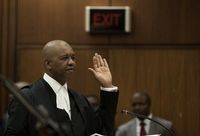Advocate Dali Mpofu SC is set to face a disciplinary inquiry before the Legal Practice Council’s (LPC) disciplinary committee on April 30, 2025. This inquiry comes in light of seven charges against him for breaching the code of conduct for legal practitioners. These charges include serious allegations such as bringing the profession into disrepute, impugning individuals' characters, and failing in his duty to the court.
The LPC's charge sheet highlights specific instances of Mpofu's conduct during the parliamentary impeachment inquiry of former public protector Busisiwe Mkhwebane. Notably, it accuses him of attempting to damage the reputation of Mkhwebane’s predecessor, Thuli Madonsela. According to the charge sheet, Mpofu spent “many hours” cross-examining Madonsela, “attempting to impugn her character, when he should have known that her answers would not be material to her credibility or any material issue.” This raises questions about the appropriateness of his questioning methods and the professional standards expected from legal practitioners.
Another significant charge involves Mpofu's remarks directed at the chairperson of the inquiry, Qubudile Dyantyi. During the proceedings, Mpofu allegedly told Dyantyi, “You will pay one day,” further clarifying that this was “not a threat, it’s a promise.” Such statements have drawn criticism for potentially undermining the integrity of the inquiry process.
In addition to these charges, Mpofu is also accused of impugning the character of Johann van Loggerenberg, a former official at the South African Revenue Service, insinuating that he was not of sound mind during the inquiry. This particular charge highlights the broader implications of Mpofu's conduct on public trust in the legal profession.
Furthermore, two of the charges relate to Mpofu’s behavior during the Judicial Service Commission interviews in February 2022. One charge concerns a comment made during the interview of Chief Justice Mandisa Maya, who was then the President of the Supreme Court of Appeal. The second charge relates to a line of questioning that reportedly “descended into a character assassination” of Gauteng Judge President Dunstan Mlambo. Such allegations suggest a pattern of behavior that may reflect poorly on Mpofu’s professional integrity.
Adding to the scrutiny, a 2022 judgment from a Johannesburg high court raised concerns about a letter Mpofu sent to three judges in a matter, which reportedly “reprimanded [the bench] for having the impertinence to request clarification on the issues which fall for determination.” This incident underscores the importance of maintaining respectful and professional interactions within the judiciary.
The LPC has consolidated multiple misconduct complaints against Mpofu into this single inquiry, indicating the seriousness and breadth of the allegations against him. As the inquiry approaches, the legal community and the public are closely watching how this situation unfolds.
In light of these developments, a poll has been conducted asking the public whether they perceive Dali Mpofu as ill-tempered or misunderstood. This question reflects the polarized opinions surrounding Mpofu, who has been a prominent figure in South Africa’s legal landscape. The outcome of this poll may provide insight into public sentiment regarding Mpofu’s conduct and reputation.
As the disciplinary inquiry date approaches, the legal profession faces a critical moment. The outcome of this inquiry could have significant ramifications not only for Mpofu but also for the broader legal community in South Africa. Legal practitioners and observers alike are keenly aware that the integrity of the legal system is at stake, and the standards upheld by its members are crucial for maintaining public trust.
In conclusion, the impending disciplinary inquiry against Dali Mpofu SC serves as a reminder of the importance of accountability within the legal profession. The charges against him highlight the need for legal practitioners to adhere to high ethical standards, ensuring that their conduct reflects the dignity and integrity of the profession. As the inquiry unfolds, all eyes will be on the LPC and the implications of its findings.



